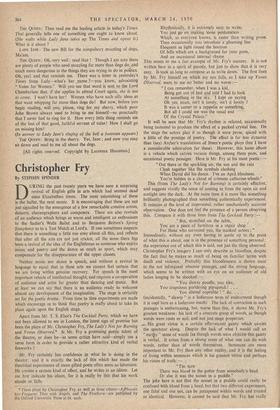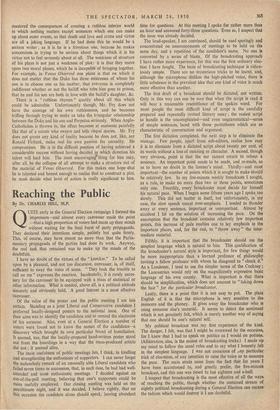Christopher Fry
By STEPHEN SPENDER
DURING the past twenty years we have seen a surprising revival of English gifts in arts which had seemed dead since Elizabethan times.• The most astonishing of these is the ballet, the next music. It is encouraging that these are not just signalled by the emergence of a few remarkable creative artists, dancers, choreographers and composers. There are also revivals of an audience which brings as warm and intelligent an enthusiasm to the Sadler's Wells Ballet and to Benjamin Britten's Spring Sytnphony as to a Test Match at Lord's. If one sometimes suspects that there is something a little too cosy about all this, and reflects that after all the arts are not just cricket, all the same there has been a revival of the idea of the Englishman as someone who enjoys music and poetry and the dance as much as sport, which may compensate for the disappearance of the upper classes.
Neither music nor dance is speech, and without a revival in language to equal that in these arts we cannot feel certain that we are living within genuine recovery.. For speech is the most important vehicle of intellectual thought, and requires a co-operation of audience and artist far greater than dancing and music. But at least we can say that there is an audience ready to welcome almost any development of the imagination. The stage is certainly set for the poetic drama. From time to time experiments are made which encourage us to think that poetry is really about to take its place again upon the English stage. ,
Apart from Mr. T. S. Eliot's The Cocktail Party, which we have not been allowed to see in London, the latest sign of promise has been the plays of Mr. Christopher Fry, The Lady's Not for Burning and Venus Observed.* is Mr. Fry a promising poetic talent of 0
the theatre, or does he—as some critics have said—simply use a verse form in order to provide a rather attractive kind of verbal theatre: and it is exactly the lack of this which has made the theatrical experiments of more gifted poets often seem so laborious. fireworks ?
Mr. Fry certainly has confidence in what he is doing in the
He creates a certain kind of effect, and he writes in an idiom. Let me first indicate his idiom, for it Is really by this that his work stands or falls.
* These plays by Christopher Fry, as well as three others—A,Phoenix too Frequent, Thor with Angels, and The Firstborn—are published by the Oxford University Press at 6s. each.
Rhythmically, it is extremely easy to write.
You just go on making loose pentameters Which, as everyone knows, is easier than writing prose.
Then occasionally you introduce a gleaming line Eloquent as light round the horizon Of hills which are a background for your puns, And an occasional internal rhyme
This seems to me a fair example of Mr. Fry's manner. It is not written here in a spirit, of parody, but just to show that it is very easy. It- took as long to compose as to write down. The first lines by Mr. Fry himself on which my eye falls, as I take up Venus Observed, seem to me no better and no worse:-
" I can remember, when I was a kid, Being got out of bed and told I had to look At something in the sky. t kept on saying Oh yes, mum, isn't it lovely, isn't it lovely ? It was a comet or a zeppelin or something, But all I could see was the usual end Of the Crystal Palace."
It will be seen that Mr: Fry's rhythm is relaxed, occasionally being tautened to produce the effect of a packed crystal line. On the stage the actors play it as though it were prose, spiced with a little of the prestige of poetry. The effect is far less dynamic than (say) Archer's translations of Ibsen's-poetic plays (but I have a considerable admiration for these). However, this loose idiom is a vehicle which carries various things, among them puns, and occasional poetic passages. Here is Mr. Fry at his most poetic : - " Out there in the sparkling air, the sun and the rain Clash together like the cymbals clashing When David did his dance. I've an April blindness. You're hidden in a cloud of crimson catherine-wheels." This (from The Lady's Not for Burning) is certainly effective,
and suggests vividly the sense of coming in from the open air and sunlight into the dark. At the same time it is more 'like something brilliantly photographed than something authentically experienced. It remains at the level of impersonal, rather mechanically accurate observation. One does not feel the presence of a person observing this. Compare it with three lines from The Cocktail Party:— "But, stretched on the table,
You are a piece of furniture in a repair shop For those who surround you, the masked actors • " Immediately, without my even having to quote up to-the point of what this is about, one is in the presence of something personal: the experience out of which this is said, not just the thing observed. Christopher Fry's imagery 1 can only describe as bloodless, despite the fact that he makes so much of. being on familiar terms with death and violence. Probably this bloodlessness is shown most in the not infrequent obscene passages, and the strong language, which seems to be written with an eye on an audience of old ladies longing to be shocked : - " You slawsy poodle, you tike, You crapulous puddering pipsqueak.! . . . You dismal coprolite ! " &c. . . .
(incidentally, " slawsy " is a ludicrous term of endearment though it is usgd here as a ludicrous insult). The lack of conviction in such passages is embarrassing, but, worse than this, it shows Mr. Fry's greatest weakness: his lack of a concrete grasp of words, as though words were roots or soil, and not just stage properties.
His great virtue is a certain effervescent gaiety which carries
the spectator along. Despite the lack of what I would call an " eagy " sense of words (as though words were objects4 this gaiety is verbal. It arises from a strong sense of what one can do with words, rather than of words themselves. Sentences are more important to Mr. Fry than any other reality, and it is the feeling of living within sentences which is his greatest virtue and perhaps his vision of truth:— " I'm sure There was blood in the gutter from somebody's head Or else it was the sunset in a puddle."
The joke here is not that the sunset in a puddle could really be confused Vvith blood from a head, but that two different experiences, one fatal and one not, can be juxtaposed within words and treated as identical. However, it cannot be said that Mr. Fry has really mastered the consequences of creating a ruthless interior world in which nothing matters except sentences which one can make up about outer events, so that death and love and crime and virtue are all a joking language. If he had done this he would be a serious writer ; as it is he is a frivolous one, because he makes concessions in trying to be serious about things which it is his virtue not to feel seriously about at all. The weakness of structure of his plays is not just a weakness of plot: it is that they move upon two moral planes, which he is incapable of bringing together. For example, in Venus Observed one plane is that on which it does not matter that the Duke has three mistresses of whom his son is to choose one as his mother, that everyone is completely indifferent whether or not the bailiff who robs him goes to prison, that he and his son are both in love with the bailiff's daughter, &c.
There is a " ruthless rhymes " quality about all this which could be admirable. Unfortunately though, Mr. Fry does not have the courage of his own ruthlessness, and he becomes trifling through trying to make us take the triangular relationship between the Duke and his son and Perpetua seriously. When Anglo- Catholicism is thrown in, the effect becomes at moments painfully like that of a curate who swears and tells risque stories. Mr. Fry does not create any kind of reality because he does not, like, say Ronald Firbank, make real his own passion for unreality. He compromises. He is in the difficult position of having achieved a considerable success without having decided in which direction his talent will lead him. The most encouraging.' thing for him may, after all, be the collapse of all attempt to make a structure out of the material of Venus Observed. For this makes one hope that he is talented and honest enough to realise that to construct a plot, he must decide what level of action is really significant to him.































































 Previous page
Previous page